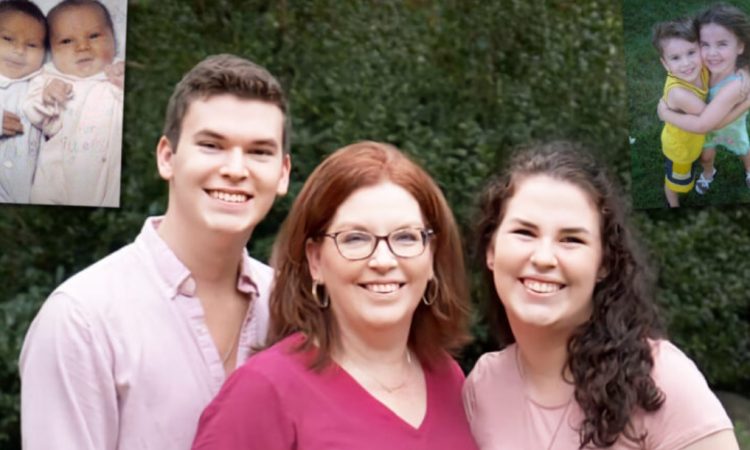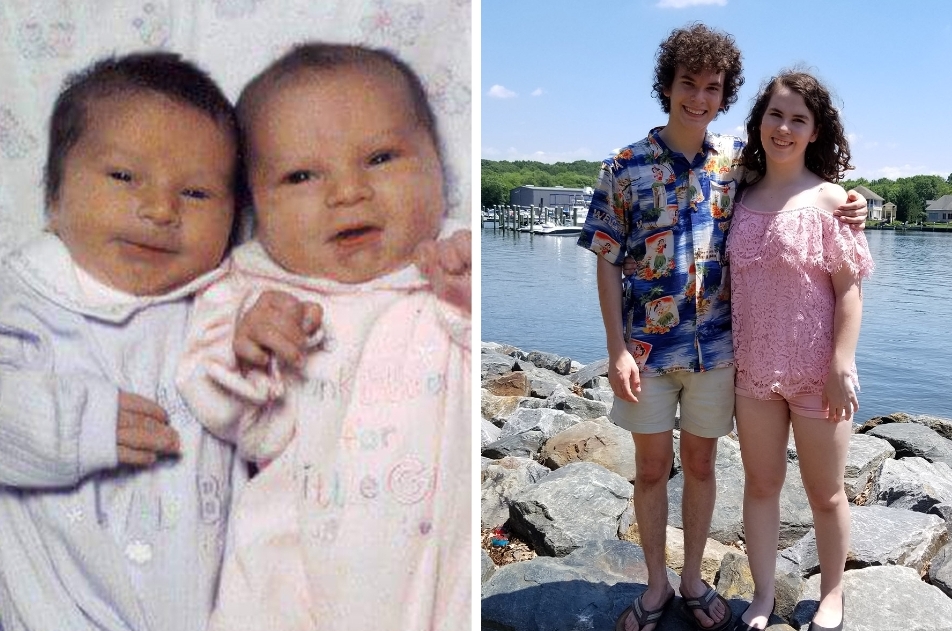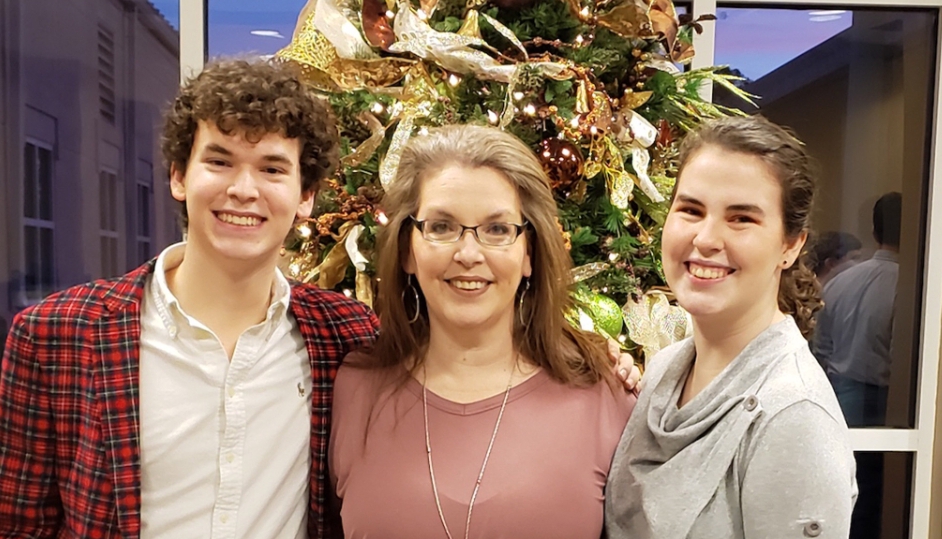Woman Who Conceived Twins in Rape Rejects Abortion, Shares How Her 21-Year-Old Twins Saved Her Life

Even today, Nancy Kelly swears she heard the sound of her unborn baby’s scream during the first abortion procedure she underwent.
The sound would haunt her from that day forward.
It made such an impact on her heart that she chose to not abort the twins she would conceive years later, after she was raped.
Today Kelly, 55, is a pro-life advocate who proudly vocalizes that those very same twins, now 21 and thriving, in fact saved her life.
A product of her being traumatically molested in youth, Kelly’s subsequent promiscuity in her early 20s led to pregnancy out of wedlock. Her then-partner compelled her to terminate the pregnancy.
What she heard that day—that soul-destroying scream—she believes, validates that an unborn baby isn’t just a “blob of cells.
“I still swear to this day, as they were ripping parts of my baby’s body from me, that I heard a scream,” she told The Epoch Times. “I mean, having your limbs ripped from your body one at a time is painful. A baby is more than just—you know, a baby is a life.

Kelly was a registered nurse, then in her early 30s at John Hopkins Hospital in Baltimore, when she experienced severe PTSD as a result of her abortion experience (she recalled being coerced into having a second one a year later); that trauma would torment her until much later in life, when she found faith.
But the haunting memory jarred her enough to reject the procedure in time to save two other lives.
Then working three jobs, already a mother of five, Kelly learned she was pregnant again, but now with twins. She went for an ultrasound on her lunch break at the hospital, she recalled, where one of the doctors made her a chilling offer.
“She said, ‘I know about your situation.’ She goes, ‘You’re pregnant with twins,’ and I was like, you know, in a state of disbelief,” Kelly said. “And she goes, ‘I can help you.’
“I didn’t know what she was talking about at first, and she said, ‘You’re too far along to go and have an abortion, but we can make arrangements for you to come in for a hospital stay for an illness. We can make sure that when you leave, you’re no longer pregnant.’
“And I said, ‘That’s not legal.’ She goes, ‘What’s not legal?’ I said, ‘An abortion.’ She said, ‘I didn’t say anything about abortion,’ and she kind of looked at me. And I said, ‘What? How else’—she goes, she stopped me, and she said, ‘Think about it. Offer is on the table,’ and she left.”
Kelly was in disbelief that anyone could say such a thing, seeing two beating hearts on the ultrasound screen. Her past trauma had made her sober.
Far from being a woman of faith at the time, Kelly was, by her own admission, a “pagan” who practiced that belief system, including rituals such as jumping over brooms and casting spells—the whole works.
Looking back, she believes it was the “moral compass” given to all people, believers and non-believers alike, from God, that compelled her to reject termination flat out. She felt unworthy of being a mother for what she had done.
She shared that some in society hold the ideology or belief that children conceived because of rape should be aborted—or even killed. Even some conservatively-minded individuals consider rape to be the exception, when abortion is “okay.”
Kelly has been asked if she wished to see the face of her rapist in her children’s faces for the rest of her life, as if that was reason enough to end their lives.
It was not just her moral compass but also her faith that would engender the wisdom to rebut that narrative—she would realize the unexpected blessings that stem from the hardships we are dealt in life.
That spiritual awakening came after she moved to Alabama to distance herself from the man who raped her.
It wasn’t easy moving to a new town where she knew no one and had no job to support her large family.
Their community of pro-life Christians kept their heads above water. For two years, they lived in a homeless women’s shelter; Kelly had to attend Bible study regularly where there were plenty of “angry women” also in attendance; many just fulfilled the obligation, trying their utmost to not pay attention.
At one particular study though, Kelly heard one “wonderful” Christian woman and had a breakthrough.
“That night, I just went to my room, and I think I was weeping and wailing. And [I said, ‘God,] if you’re real, you got to show me, because at this point I feel like you just left me to just wallow in my sin in my life, and I don’t deserve this,’” she said.
“At that point, there was a peace that came over me. That confirmed to me that, you know, that God was real.”
That validation “didn’t make life easier,” she said, but “it made it easier to deal with life.” A similar understanding dawned on her in raising her twin babies, Gracie and Ryan.
In them, Kelly saw how the horror of what abortion had inflicted upon her life, could be so markedly contrasted by the unexpected blessings from choosing life—God made that possible.
“I daily looked at the faces of my children and knew that there were two that were missing, that there were faces that I would never know, hugs that I would never get, and laughter that I would never have,” she said. “God blessed me by making me pregnant with those kids.”
Were it not for them, Kelly might not have found life worth living. They were her reasons.
“If I’d given my babies away, I wouldn’t have had that blessing to look at and say, ‘These are the reasons.’ [The] Bible says that God takes everything and uses it for the good of those who love Him and are called by His purpose.”
Oddly, life started to improve afterward.
“One of the ladies from my church called me and said, ‘I heard you are cleaning houses or something, because I needed somebody to clean my house,’” Kelly recalled. “And I kind of laughed and I was like, ‘No, I haven’t been cleaning anybody’s house. But if you want somebody to help you clean your house, I could use the extra money.’”
Within a few weeks, the mom had a tidy little cleaning business to support herself and her seven kids.
Today, living in Chelsea, Kelly and her son remain devoted to faith. Ryan even aspires to become a church leader. Meanwhile, her daughter Gracie lives with her eldest sister out-of-state, where she plans to attend college.

Still, the malicious narrative perpetuated by certain segments in society: that “rapist’s babies” somehow “deserve to die,” or somehow do not deserve to live, has been a painful hurdle for the three—one that Gracie has, to some extent, succumbed to in the formation of her own beliefs.
“You hear the propaganda enough and you’re surrounded by it without any counter, sometimes you take on those beliefs,” Kelly said. “And despite the fact that she knows my story, and all the sacrifices that I made to make sure that she was here, she is among those who will say, ‘Well, just because you’ve got to make the choice, doesn’t mean everybody else has to.’”
Of the cruelty emanating from certain domains of society, Kelly believes that “Satan is hard at work, turning good evil and evil good,” yet she finds solace in telling others how choosing life was a blessing in disguise that redeemed her life.
She is quick to point out how life-affirming communities abound across the nation, offering robust networks of support for women in need. Resources are plentiful: be they accommodations, food and clothing, furniture, and everything in between.
Added Kelly, “When I walk into heaven and someone will say, ‘I met Jesus because of you,’ or, ‘I didn’t abort my child because of what I heard,’ or ‘I’m here because my mother made a decision because she heard you talk.’ That’s where my measure of success is.




